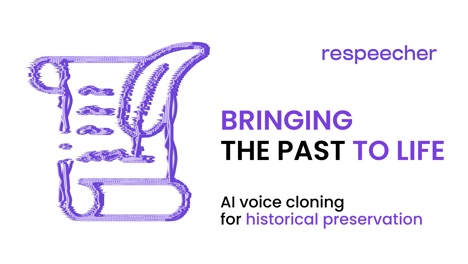The Role of AI Voice APIs in Building Accessible Smart Cities

As urban environments are becoming smarter, the role of AI voice API in enhancing accessibility becomes increasingly critical. Smart cities make use of technologies like AI, IoT, and data analytics in order to manage operations efficiently, improve infrastructure, and provide better services to citizens.
Current AI voice APIs, such as the one available from Respeecher, are playing an equally important role in making these cities more inclusive through the accessible solutions offered for the communication of all its citizens, especially the ones with any disability. From public transport systems to emergency response and information kiosks, voice technology is opening up possibilities for making urban spaces more accessible and user-friendly.
Introduction to Smart Cities and AI Voice Technologies
Smart cities use the latest technologies in the management of urban systems for better livelihoods, hence making them viable and sustainable. AI Voice Technologies, including Text-to-Speech and Voice Synthesis APIs, are among the key features in enhancing more access. AI Voice APIs transform interactions that citizens have with infrastructure in cities, making it all inclusive, offering real-time information, giving personalized voice services.
City planners and developers can use high-quality voice via Respeecher's API within smart city applications, thereby enhancing services such as public transportation announcement services, information kiosks accessible to everybody, and emergency systems, where critical information shall be comprehensively accessible to all, including persons with disabilities.
Importance of Inclusivity in Urban Planning
Inclusivity lies at the heart of urban planning, and smart cities do not deviate from this concept. As long as more and more technologies are being implemented within cities, it becomes crucial to ensure that all citizens can take advantage of these developments, irrespective of their physical abilities. For visually impaired, illiterate, or otherwise disabled people, AI voice APIs provide critical means for interacting with public services independently.
More importantly, the addition of voice-enabled solutions to a smart city architecture is not for convenience but all about equal opportunity in accessing city services. The AI voice API bridges the gap between technology and inclusivity through better access to public services that are easier to navigate.
AI Voice Role in Smart Cities
Smart City Communication APIs
AI voice APIs form the foundation for the communications infrastructure of a smart city. In this context, public services become able to issue real-time voice information that promotes access to such urban services from all sections. For instance, AI-driven Smart City Communication API can be interfaced with a public service notice so that audio-enabled kiosks and public transport systems clearly deliver real-time updates.
At Respeecher, such innovative state-of-the-art voice generation and synthesis technologies complement the Smart City concept. Enabled by technology that can generate very natural voices-sounding humans can only enhance interaction but also offer public services using an inclusive interface to reach the population.
Applications for Public Transportation
Public transportation is one of the most prominent areas in which AI voice APIs are changing smart cities. Voice APIs are used for making real-time announcements regarding schedules, delays, and route changes to ensure that every citizen, irrespective of visual impairment, has up-to-date information.
For instance, Transport for London, or TfL, in London has implemented AI voice technologies for its underground and bus systems that deliver real-time updates. Such AI voice systems are important because they make public transport more accessible to both the citizens and the visitors by having clear, natural language announcements in many languages.
Apart from this, Respeecher also allows developers to develop text-to-speech and speech-to-speech conversion systems for public transportation with additional benefits for all passengers and commuters.
Improved Accessible Information Units
Accessible Information Kiosks
Kiosks are a vast component of contemporary smart cities that provide information to the public easily. However, most kiosks are inaccessible to people who are visually impaired or illiterate. These kiosks, with AI voice APIs, can now offer voice-driven solutions to make information easily accessible to all.
Places like Seoul are already using voice-enabled kiosks, implementing text-to-speech to help guide users through various services, such as public information or wayfinding. Such systems improve user interaction and make the city services more inclusive.
Respeecher's voice synthesis API gives cities a way to deliver voices that are even more natural-sounding within those kiosks, thereby making interactions accessible but also engaging for users.
Emergency Response Systems
AI voice APIs are also revolutionizing smart cities in emergency response systems: Voice-driven emergency alerts can deliver fast and accessible instructions to citizens in an emergency. For instance, AI voice technologies could allow the broadcasting of evacuation routes, safety measures, and other critical information in a city that frequently encounters natural disasters.
In cities like Tokyo, voice-enabled emergency systems provide multilingual alerts and clear instructions during earthquakes or typhoons. These systems ensure that all citizens, regardless of language or ability, can understand and respond to critical situations.
Respeecher’s speech synthesis solutions can be integrated into emergency systems to provide realistic and highly intelligible voices, improving the effectiveness of these alerts.
Inclusivity in Urban Design
Voice Technologies and Urban Accessibility
Voice technologies play an important role in enhancing urban spaces for better accessibility. Moving around public places is complicated for people with disabilities. Integrating voice-driven solutions into cities will make those cities more inclusive for a variety of citizens. AI voice API allows for creating accessible navigation, voice-controlled public services, and voice-assisted wayfinding.
In Barcelona, smart city projects are already using voice technologies in public spaces to improve the lives of people with disabilities. Such solutions offer a flavor of how voice APIs can be used to create more inclusive cities worldwide.
With the Respeecher API, urban planners will be able to introduce advanced, human-like voices in every level-from public kiosks up to transportation hubs-to make life within the city truly inclusive and accessible at every turn.
Ethical Considerations and Challenges
Privacy and Security Concerns
Similar to any AI-driven system, the issue of privacy and security will need to be addressed. As much as Smart city infrastructure depends on data, voice APIs will also be heavily dependent on the same. Proper data privacy protocols should be developed and implemented in order to keep voice interactions safe and personal data private.
Ethical Use of AI in Public Spaces
Ethical use of AI in public spaces is critical. The design of the AI system should be done in a manner that it does not have bias and gives equal opportunity to all citizens. Maintaining public trust requires openness in the management and use of speech data.
Case Studies and Real-World Examples
London: Transport for London
London has been able to successfully incorporate AI-based voice engineering into its TfL system. It implemented real-time voice announcements to provide accurate timely information to all commuters, both with and without disabilities. Since its implementation of AI voice APIs in public transport, London has immensely improved user satisfaction and accessibility.
Seoul: Voice-Enabled Information Kiosks
In Seoul, voice-enabled information kiosks have been set up around the city. These systems use text-to-speech technology to deliver accessible commands for users, and even visually impaired ones. With the AI Voice API, this has made public information more accessible, thus making it an inclusive urban environment.
Respeecher: Enhancing Public Spaces with AI Voice Technology
Cities like Amsterdam are experimenting with Respeecher’s advanced voice synthesis to create more inclusive public spaces. By integrating high-quality, human-like voice technology, these cities can provide clearer, more accessible communication in transportation systems, information kiosks, and emergency alerts.
Step-by-Step Strategies for Implementing AI Voice APIs in Smart Cities
- Assess Accessibility Needs: Identify key areas where AI voice technology can enhance accessibility (e.g., public transportation, kiosks, emergency systems).
- Choose AI Voice Provider: Collaborate with renowned providers like Respeecher for high-quality, ethical, and human-like voice solutions.
- Deploy Voice APIs Across Urban Services: AI voice APIs should be deployed in every important area of public transport, kiosks, and emergency response to make services inclusive.
- Monitor and Iterate: Periodically assess the performance of voice systems and upgrade them with user feedback and technological advancements.
These strategies help cities create a competitive edge, reduce churn rates in public services, and enhance loyalty and trust among citizens by providing accessible, user-friendly interactions.
Conclusion
AI voice APIs are continuing to disrupt the game in the way smart cities handle their communication and inclusivity. Ensuring cities incorporate natural-sounding voice technologies can improve accessibility, providing opportunities for everyone, especially persons with disabilities, to enjoy equal access to urban services. Moving forward with the adoption of smart cities includes collaboration with pioneering companies like Respeecher, enabling cities to adopt ethically human-like voices that make public spaces friendly.
The future of urban planning will be in smooth integration into new AI voice technologies. Voice APIs adoption should become top of the agenda for city planners and policy thinkers in making an accessible and equal urban environment for all citizens.
FAQ
A smart city is a technology-driven urban area that integrates AI, IoT, and other digital tools to optimize resources, improve infrastructure, and enhance the quality of life for residents. By using data-driven solutions, smart cities aim to streamline services like transportation, energy management, and communication.
Building a smart city involves implementing AI, IoT, and voice API technologies into urban planning. These technologies help optimize infrastructure, enhance public services, and improve accessibility, making cities more efficient and citizen-friendly.
Yes, smart cities leverage AI to optimize services like traffic management, waste disposal, and energy distribution. Technologies like AI voice APIs (e.g., Respeecher API) also enable more accessible communication through real-time announcements and public service updates.
AI improves smart city management by analyzing real-time data, automating service delivery, and enhancing public communication. Voice APIs (such as Respeecher API) allow cities to offer accessible, voice-driven services like public announcements and information kiosks, improving overall infrastructure efficiency.
Glossary
Smart City
IoT (Internet of Things)
Voice Synthesis
AI
API (Application Programming Interface)
- voice synthesis
- AI voice
- AI voices
- voice synthesizer
- AI voice generator
- Respeecher Voice Marketplace
- text to speech AI
- AI generated voice
- AI voice over
- AI voice synthesizer
- AI speech generator
- voice ai
- AI voice generation
- voice over AI
- voice AI generator
- AI voice text to speech
- AI voice applications
- text to voice AI
- voice cloning API
- AI voice changer API
- Respeecher API
- innovative voice technologies
- AI in media production
- speech-to-speech conversion
- text-to-speech synthesis
- advanced voice cloning
- API Integrations
- speech synthesis API for developers
- smart cities AI voice
- AI voice in urban planning
- smart cities
- accessible city technology
- smart city communication APIs
- AI cities
- what is a smart city







